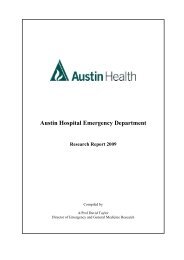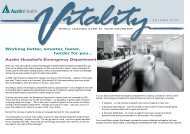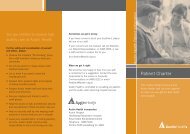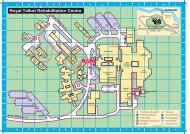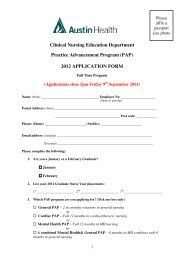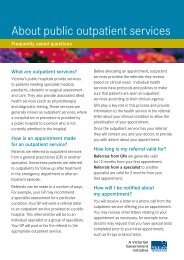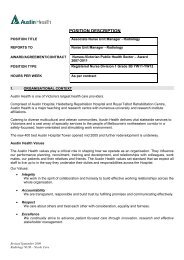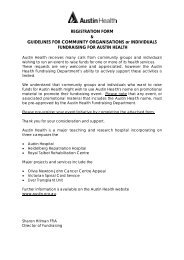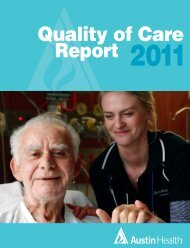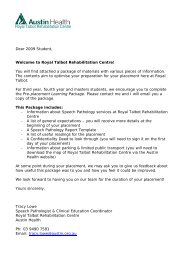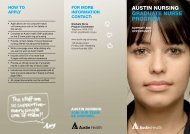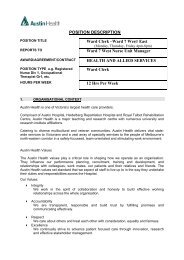two heads are better than one! - Austin Health
two heads are better than one! - Austin Health
two heads are better than one! - Austin Health
- No tags were found...
Create successful ePaper yourself
Turn your PDF publications into a flip-book with our unique Google optimized e-Paper software.
s p r i n g 2 0 0 8W o r l d l e a d i n g c a r e at y o u r d o o r s t e pWhen it comes to Alzheimer's<strong>two</strong> <strong>heads</strong> <strong>are</strong><strong>better</strong> <strong>than</strong> <strong>one</strong>!<strong>Austin</strong> <strong>Health</strong>’s Associate Professor Michael Woodward, Professor Christopher Roweand their respective teams <strong>are</strong> working in a bid to beat the devastating effects ofAlzheimer’s Disease. While it is still early days, Vitality is pleased to report that thepreliminary results of their trials <strong>are</strong> highly promising.“Studies show that up to <strong>one</strong> in three Australians will develop Alzheimer’s Disease,” said ProfessorWoodward, the Head of <strong>Austin</strong> <strong>Health</strong>’s Aged C<strong>are</strong> Services. “By 2030, there will be more peopledying from Alzheimer’s <strong>than</strong> any other condition.”While these statistics <strong>are</strong> of great concern, it is somewhat comforting to know that the <strong>Austin</strong>Hospital has <strong>one</strong> of the largest research units in Australia dedicated to Alzheimer’s Diseaseand other causes of dementia. Already work is underway in detecting the disease as well asdetermining the most effective drug therapies. What is more, significant inroads have been made.Earlier detection is now possibleIn the past, the only way that Alzheimer’s could be confirmed was through an autopsy. Now, it ispossible for both patients and even healthy people without a clinical diagnosis of dementia to bescanned and the disease detected, in some cases before the onset of symptoms.A key comp<strong>one</strong>nt of Alzheimer’s Disease is the build-up of a protein called beta-amyloid, whichforms plaques in the brain. The Positron Emission Tomography (PET) scan is d<strong>one</strong> in conjunctionwith dyes that have a radio-isotope attached.As Professor Rowe, <strong>Austin</strong>’s Director of Nuclear Medicine explained: “The dye is only radioactivefor an hour. We inject the patient, wait 30 minutes, then put them in the scanner. The radio-
MovingforwardA <strong>than</strong>k you messagefrom the CEOIt's been a busy few monthsat <strong>Austin</strong> <strong>Health</strong>. In Julywe opened our refurbishedSurgery Centre at the <strong>Austin</strong><strong>Health</strong>'s Heidelberg Repatriation Hospital. Thanksto $8 million in State Government funding, theCentre will allow us to treat an additional 2,000elective surgery patients a year.We were also awarded a four-year accreditationperiod from the Australian Council on <strong>Health</strong>c<strong>are</strong>Standards. This is a significant achievement,recognising <strong>Austin</strong> <strong>Health</strong>'s commitment todelivering quality patient c<strong>are</strong> and services.Of course, much of the credit for our hospital'sexcellence goes to you, our generous supporters.This is particularly true of our Liver Transplant Unit,which is celebrating 20 years of life-saving workgiving hundreds of Victorians a second chanceat life.This edition also focuses on ways forwardin treating a growing problem in our ageingpopulation – Alzheimer’s Disease. It is throughvital clinical trials, many of which <strong>are</strong> undertakenat our Memory and Cognitive Research Unit, thatwe can progress towards early detection and<strong>better</strong> control of this major health concern.Your on-going support is a vital <strong>one</strong> that helps<strong>Austin</strong> <strong>Health</strong> continue to deliver world-class c<strong>are</strong>and extensive research, in our mission to keeppeople as healthy and independent as possible.Thank youDr Brendan MurphyChief Executive Officer(continued from cover...)isotope will then highlight any betaamyloidin the brain. It can also be usedfor patients trialling disease-slowingtherapies as evidence the drugs <strong>are</strong>working."The <strong>Austin</strong> Hospital’s Nuclear Medicineteam has been working in collaborationwith CSIRO researchers. A cyclotron,which is a machine encased in a2m thick concrete bunker, makes theradio-isotypes.These <strong>are</strong> then brought to the chemistrylab and attached to the dye. Because ofthe short life of these comp<strong>one</strong>nts, theymust be made on site, immediately priorto use. As a result, each of these scanscosts in excess of $1,000.According to Professor Rowe, over 300 patients have beenscanned this way since September 2004, with around halfof these still being followed up with regular PET scans.By being able to detect Alzheimer’s Disease earlier, drugtherapies can be commenced before significant damagehas been d<strong>one</strong> to the brain.Trialling of drugs places usclose to a major breakthroughThere <strong>are</strong> different ways of approaching the treatment ofAlzheimer’s Disease. As Professor Woodward told Vitality:“We’ve been working on treatments for Alzheimer’s Diseasefor around 15 years. Currently about 50 patients a year enterour Alzheimer’s Disease trials at <strong>Austin</strong> <strong>Health</strong>. Many of thesepatients come from <strong>Austin</strong> <strong>Health</strong>'s Aged C<strong>are</strong> Service,including the <strong>Austin</strong> Hospital’s Memory Disorder Clinic.However referrals for trials also come from other sources,for example other geriatricians refer people to us who <strong>are</strong>interested in taking part in a trial. About six trials <strong>are</strong> currentlyunderway at our department”.The team collaborates on research trials of many differenttypes of drugs. These include disease-modifying drugs toremove the build-up of beta amyloid plaque in the brain.Professor Woodward cited a recent Phase II trial of anAlzheimer’s Disease drug called PBT2 which has shownpromising results in improving people’s cognitive abilities,without significant side-effects.“We <strong>are</strong> now on the threshold ofsome major breakthroughs,” ProfessorWoodward said. “Drugs <strong>are</strong> beingdeveloped that may not only reduce thesymptoms but can attack the lesions,the plaques and tangles, on the brainand dissolve these. This would meanthat we could not only arrestthe progressions of Alzheimer’s,we could hopefully in time cure thisdebilitating disease.”Sue Caldwell, Manager of <strong>Austin</strong><strong>Health</strong>'s Medical and Cognitive ResearchUnit (MCRU) said that patients decideto participate in Alzheimer’s Diseasetrials for many reasons - includingthe possibility of improving their owncognitive ability and also to help future generations who mayget this illness.“It’s a very exciting time to be involved in studying Alzheimer’sbecause we <strong>are</strong> on the verge of finding treatments which maymake a real difference.”Calling for donationsand volunteers<strong>Austin</strong> Hospital is urging every<strong>one</strong> in the community to getbehind this groundbreaking work by contributing towards thepurchase of new equipment. Right now funds <strong>are</strong> neededto purchase a number of items including a Hot Cell, aRefrigerated Centrifuge, an ECG Machine and we also needto repaint and recarpet the Aged C<strong>are</strong> Unit. If you can help i<strong>two</strong>uld be greatly appreciated.<strong>Austin</strong> Hospital is also looking for volunteers.We <strong>are</strong> looking for volunteers to undergo regular PET scanning.Participants must be 60 years or older and have mild butnoticeable memory loss. If you or somebody you know isinterested, contact Denise El-Sheikh on (03) 9496 3326 forfurther information.Volunteers <strong>are</strong> also invited to participate in Alzheimer'smedication trials. If you or somebody you know is interestedin taking part in an Alzheimer’s Disease medication trialplease contact Sue Caldwell on (03) 9496 2181.
<strong>Austin</strong> researcher winsaward for groundbreakingstroke research<strong>Austin</strong> cardiologist’sbig heart brings reward<strong>Austin</strong> <strong>Health</strong> Director of Neurology and world-renownedstroke expert, Professor Geoffrey Donnan, has beenawarded this year’s prestigious Bethlehem GriffithsResearch Foundation (BGRF) medal.The medal is in honour of Professor Donnan's 30-yearc<strong>are</strong>er and his outstanding contribution to the fieldof stroke research and management in Australia andinternationally.“Stroke is a serious health issue that affects 60,000Australians of all ages each year. The outcomes ofProfessor Donnan’s research has the potential to helpcountless stroke patients around the world,” said DrBrendan Murphy, Chief Executive Officer of <strong>Austin</strong> <strong>Health</strong>.As the National Stroke Research Institute's founder anddirector, Professor Donnan leads major research trialsinto the prevention and treatment of stroke.His team’s groundbreaking research, involving brainimaging technology, has enabled clot-dissolving agentsto be used to treat stroke sufferers, improving thechances of a complete recovery for the 30 per centof stroke patients who previously faced permanentincapacitation.With his team, Professor Donnan also disproved thebelief that the brain dies within a few hours of seriousstroke. By proving that it can survive up to 48 hours, theteam has created an opportunity for potential therapies.“This work will make it possible for more people torecover from serious stroke,” said Professor Donnan.“The challenge is to extend the efficacy of existingmedication beyond the current short three hour time limitso more people can actually walk away from stroke.”On receiving his medal, Professor Donnan said: “Thisaward is a tribute to the huge team that has beeninvolved in significant stroke research over a numberof years. Importantly, it emphasises the importance ofresearch on the overall stroke agenda".A passion to rid the world of health inequalities hasdriven <strong>Austin</strong> Hospital cardiologist Professor AndrewTonkin from the consulting room to the world stage.Professor Tonkin has a c<strong>are</strong>er that is dotted withachievements, including pi<strong>one</strong>ering strategies to reducethe rate of heart disease in Australian indigenouscommunities, which is the highest in the world.Professor Tonkin believes that healthc<strong>are</strong> interventionsfor indigenous people must be culturally appropriateand address the issues of disadvantage that lead topoor health outcomes.He pi<strong>one</strong>ered a register of aboriginal children withrheumatic fever, so that they could be given amonthly penicillin shot to prevent their developmentof rheumatic heart disease, a disease that has beenProfessor Tonkin is presented with the prestigiousSir John Loewenthal Award for his achievements inheart disease.virtually eliminated in the non-indigenous communityand other wealthy countries in the world.“You need to come up with a special approach forgroups that <strong>are</strong> the most vulnerable,” Professor Tonkinsaid.Professor Tonkin’s father died of a heart attack whenhe was only eight years old, triggering a lifelong interestin the heart. He was brought up by his mother – aschool teacher with a love of education who he creditsequally with his success.His personal research has focused on topical issuesin cardiology, such as the links between depression,psychosocial factors and heart disease, and currently,a long-term study into the effect of taking aspirin onthe heart health and cognitive function of app<strong>are</strong>ntlyhealthy older people.Professor Tonkin accepted the prestigious Sir JohnLoewenthal Award at a ceremony in June 2008,in recognition of his contribution and to establishcommunity education programs on rehabilitation,prevention and treatment of heart disease.Did you know?<strong>Austin</strong> <strong>Health</strong> is recognised as a leaderand benchmark to best practice inAboriginal health, with an Aboriginal <strong>Health</strong>Development program and dedicatedpatient and peer support workers to helpdeliver culturally appropriate healthc<strong>are</strong> forindigenous patients and their families.
The Surgery Centre heralds new eraof elective surgery c<strong>are</strong>The Surgery Centre at <strong>Austin</strong> <strong>Health</strong>'s HeidelbergRepatriation Hospital opened its doors to its first patientson 29 July 2008, after an official opening by PremierJohn Brumby and <strong>Health</strong> Minister Daniel Andrews whotoured the newly refurbished rooms.The Surgery Centre will treat 6,000 elective surgerypatients a year, allowing <strong>Austin</strong> <strong>Health</strong> to treat anadditional 2,000 elective surgery patients each year.<strong>Austin</strong> <strong>Health</strong> Surgical Clinical Service Unit Director,Bernadette McDonald, said that The Surgery Centreintroduced a new model of c<strong>are</strong> for elective surgerypatients at <strong>Austin</strong> <strong>Health</strong>.“The cornerst<strong>one</strong> of this model of c<strong>are</strong> is that patientswho <strong>are</strong> admitted for surgery will not be cancelledbecause of emergency demand, as currently occurs atmajor public hospitals,” said Ms McDonald.The Surgery Centre includes:• four operating theatres• <strong>two</strong> endoscopy suites• a ten-bed recovery unit• a twelve-bed short stay ward, and;• diagnostic infrastructure at the HeidelbergRepatriation HospitalSurgeons perform urology, plastics, general surgery,breast surgery and ophthalmology with some minororthopaedic surgery. The Centre provides treatmentoptions for patients who require day surgery or aninpatient bed of up to 72 hours.The Surgery Centre complements the <strong>Austin</strong> Hospital’srecently redeveloped Surgery and Endoscopy Centre,which treats 20,000 patients each year.Premier John Brumby, Dr Brendan Murphy and <strong>Health</strong>Minister Daniel Andrews at the official opening.Thank you!Thank you so much to every<strong>one</strong> for your donations.Your support helps us in so many ways to deliver thevery best in patient c<strong>are</strong>. In particular our <strong>than</strong>ks goesto those who have made generous donations to theHeidelberg Repatriation Hospital Heritage Appealduring recent weeks.We also extend our appreciation to Sovereign Order ofSaint John of Jerusalem for their donation to the Childand Adolescent Mental <strong>Health</strong> Unit at <strong>Austin</strong> <strong>Health</strong>.The continued support by Mr Donald Blackham to providea scholarship at the Ballarat <strong>Austin</strong> Radiation OncologyCentre is deeply appreciated.Thank you to Landsdale Rose Gardens - grower of theOlivia Newton-John Rose. Landsdale is making a donationto the Cancer and Wellness Centre Appeal for everyrose sold. The Olivia Newton-John Rose is available atBunnings, Mitre 10 and leading nurseries.Meet the teamTanya Carter manages <strong>Austin</strong> <strong>Health</strong>’sfundraising media and communications.Having worked previously for <strong>Austin</strong> <strong>Health</strong>’sCorporate Communications Department,Tanya says that role really gave her a greaterunderstanding of the diverse <strong>are</strong>as <strong>Austin</strong> <strong>Health</strong>specialises in.“I believe we havesome of the mosttalented health c<strong>are</strong>staff in the countrywho really do go thatextra mile to helppatients and theirfamilies. I’ve metsome very specialpeople and heardmany incrediblestories of courageand recovery, frompatients and staff.”Tanya’s varied role includes writing the fundraisingnewsletters, stage managing major fundraisingevents and working with media outlets to promote<strong>Austin</strong> <strong>Health</strong> and the Olivia Newton-John Cancerand Wellness Centre Appeal fundraising initiatives.Locked Bag 25, Heidelberg VIC 3084Ph: (03) 9496 5753 Email: fundraising@austin.org.au
VSCS Spinal AppealThank you to the generous donors who supported our<strong>Austin</strong> Spinal Unit equipment fundraising appeal. Youhave made the many challenges ahead for our spinalinjuredpatients a little easier.Before this week is over, some<strong>one</strong> new will beadmitted to the <strong>Austin</strong> Hospital - paralysed from aspinal-cord injury incurred through an accident. Thisirreversible life-changing experience that impacts <strong>one</strong>very <strong>are</strong>a of life could happen to any <strong>one</strong> of us.The patient’s rehabilitation journey is a long andchallenging <strong>one</strong>, as they require help with eventhe most basic functions. Part of the patient’smultidisciplinary health c<strong>are</strong> team is a primary nurse.The primary nurses at the <strong>Austin</strong>’s Royal TalbotRehabilitation Centre provide guidance, support andvaluable assistance for patients to re-gain control oftheir lives.The Spinal Nurse Unit Manager, Jennifer Batten saidthat the role is challenging for the primary nurses.“Some days <strong>are</strong> filled with laughter and sometimestears,” she said. “The satisfaction of seeing a patientmake the transition towards the next stage of theirrehab often makes the job very worthwhile.”With varying degrees of paralysis, patientsdepend on special equipment for the most basicfunctions, such as coughing or swallowing.The equipment funded from the <strong>Austin</strong> SpinalUnit appeal will help patients’ function asindependently as possible, on a daily basis.Thankyou!Yes, I wish to support <strong>Austin</strong> <strong>Health</strong>'s groundbreaking work for Alzheimer'sPlease accept my tax-deductible donation of:$35 $50 $110 $230 $___________my choiceABN 96 237 388 063I would like to donate the entire cost of a Refrigerated Centrifuge, costing $15,000I would like to donate the entire cost of an ECG Machine, costing $8,000Locked Bag 25, Heidelberg VIC 3084Ph: (03) 9496 5753 Email: fundraising@austin.org.auEnclosed is my cheque/m<strong>one</strong>y order made payable to <strong>Austin</strong> <strong>Health</strong> for theamount I have ticked:Name: Dr/Mr/Mrs/Miss/Ms ____________________OR Please debit the amount I have indicated from my:Address: __________________________________VISA MASTERCARD AMEX___________________________ P/code: ________Card no.Teleph<strong>one</strong>: _________________________________Email:_______________________________________Name on card: ___________________________________________________Supporter No. (if known): _____________________Signature: ______________________________ Expiry Date: ______/______YOUR DONATION IS TAX DEDUCTIBLEAHVSP08Please send me information about:Making a bequest in my Will to <strong>Austin</strong> <strong>Health</strong>; orI have already included <strong>Austin</strong> <strong>Health</strong> in my Will



